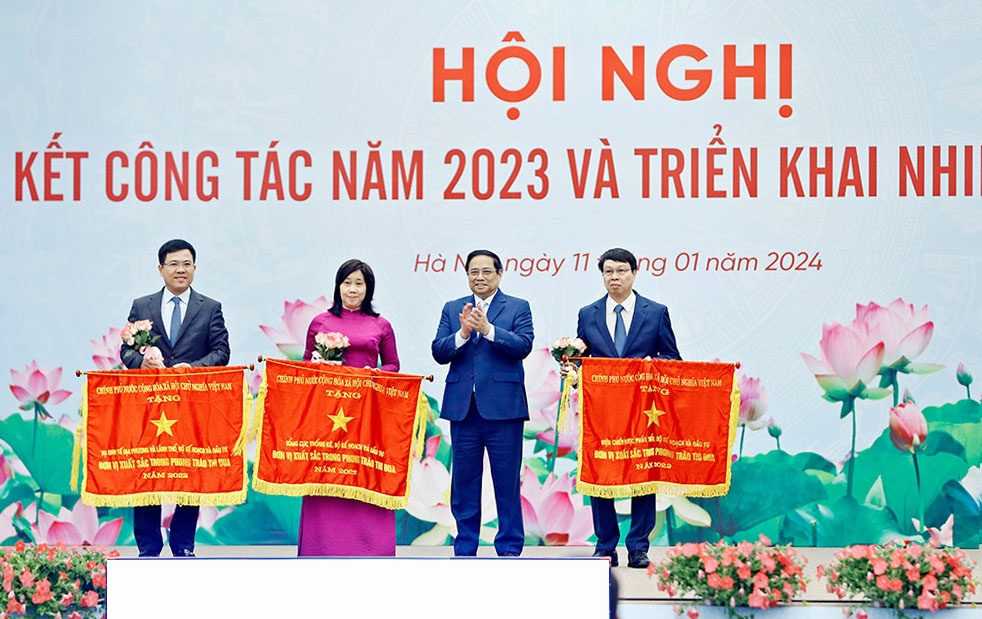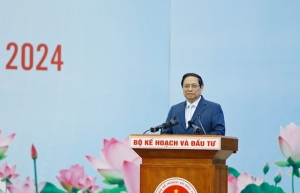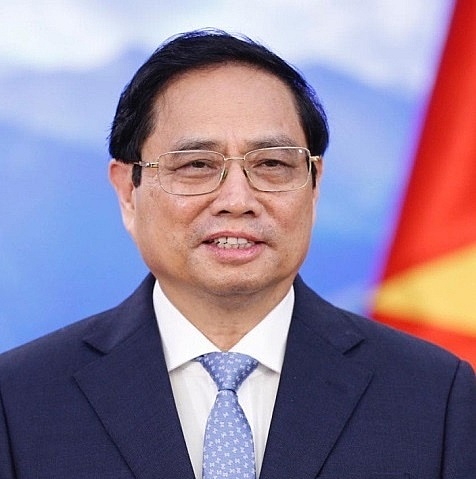Strategic vision in place to synthesise planning sector
 |
| Prime Minister Pham Minh Chinh was on hand last week to honour a number of units of the Ministry of Planning and Investment |
Last week’s conference on summarising the work and deploying tasks in the planning, investment, and statistics sector was held at the National Innovation Centre (NIC) in Hoa Lac High-Tech Park in Hanoi to find solutions for the country’s development.
Science-technology and innovation have been identified as critical in forming an innovation ecosystem in Vietnam. Therefore, the inauguration of the NIC two months previous was one of the most important events of Vietnam’s economy in 2023.
The economy achieved important results in 2023 based on a significant contribution of the Ministry of Planning and Investment (MPI) as a strategic advisory agency of the Party and state on socioeconomic development. However, more uphill battles are around the corner.
“Although economic growth in 2023 was positive, this is the third consecutive year lower than the overall average target of the five-year plan and the 10-year strategy. GDP per capita in 2023 was only almost $4,300, far from the target of about $4,700-5,000 by 2025,” said MPI Minister Nguyen Chi Dung at the conference.
There is also a risk of falling into the middle-income trap, and an ageing population challenge. It is feared the government has not taken full advantage of the country’s “golden population” opportunities. The country’s industrialisation and modernisation process is still also slow, not keeping up with global requirements.
There are too few large private-owned groups with strong capacity, and high regional and international competitiveness, Minister Dung added.
“Although mobilising foreign investment in 2023 was a bright spot with $36.6 billion in total registered capital and $23.2 billion in disbursed capital, there are still many issues, like promoting links between the foreign-invested sector and local businesses, and improving position in global value chains,” he said.
In addition, national governance has not kept up with the world’s rapidly changing trends; regional connectivity is struggling; and sci-tech and innovation are not yet the main driving force for rapid and sustainable development.
These challenge for the economy are also a challenge for the work of the MPI. “The ministry has to continue to make more efforts in planning management and macroeconomic coordination,” PM Pham Minh Chinh said.
He said that it was necessary to build socioeconomic development scenarios in 2024 to minimise difficulties, and take full advantage for rapid and sustainable socioeconomic development and recovery, achieving set goals, and tackling unmet targets in economic growth and labour productivity.
“It is necessary to closely monitor regional and world developments, clearly identify opportunities and challenges, improve forecasting, and update socioeconomic development scenarios,” PM Chinh said
| Pham Minh Chinh, Prime Minister
In 2023, the MPI and the sector successfully completed a large amount of work in fields related to its functions, tasks and powers. The sector has performed well the role of a strategic-level general advisory agency, as a focal and coordinating agency for macroeconomic management. The work of improving institutions and policy mechanisms continues to be focused and implementation is accelerated, especially to promote innovation and remove obstacles. There is a change in thinking and action in planning work, meeting progress and quality with new thinking, a new vision, and new opportunities. 2023 was a year of planning. 109 of 111 plans have been completed. Resolutions of the Politburo on the development of six socioeconomic regions were actively implemented. Disbursement of public investment was also a bright spot. The progress of public investment disbursement has clearly improved month by month and quarter by quarter. The disbursement rate in 2023 will reach about 95 per cent, higher than in 2022. The MPI has been good at improving the business investment environment, developing businesses and attracting foreign investment with positive results. Innovation and creative startups have developed strongly. Based on self-reliance, the MPI inaugurated the NIC and attracted 41 investment funds to invest $1.5 billion from 2023-2025. Analytical, forecasting and statistical capabilities have been improved, contributing to the accuracy and quality of macroeconomic advisory and management. For 2024, the MPI should closely follow the conclusions and resolutions of the Party Central Committee, the National Assembly, and the government. There are several critical tasks for the MPI going forward. It must make greater efforts in macroeconomic planning and coordination. It needs to better institutions and policies to implement strategic breakthroughs it institutions, infrastructure, and human resources; and the ministry must mobilise and effectively use resources for investment in national development, especially in innovation. The economy needs to be restructured in terms of innovating growth models, and new economic models and fields, such as semiconductors, hydrogen, renewable energy, green transformation, digital transformation, and the circular economy. National digital transformation must be carried out alongside reform of administrative procedures, while improving the business investment environment, and enhancing communications and transparency. The MPI must do a good job of international economic integration, enhancing the attraction of foreign investment and external resources. Finally, it is critical that the ministry report on the implementation of its plans for socioeconomic development strategy to submit to the 14th National Party Congress. |
At the same time, Minister Dung assigned tasks to officials and employees in the sector. He also said the MPI and the entire industry must continue to consolidate and promote a strategic vision of development.
“This is the core of all policies to consolidate and unleash internal forces, and utilise external resources for Vietnam to move faster and more sustainably,” he added.
Dung emphasised building a regional and international financial centre in Vietnam; finalising the fund on supporting investment to utilise global funding flows; and welcoming direct and indirect capital from foreign investors, especially multinational corporations and strategic investors.
“If these efforts are implemented effectively, the MPI will complete its tasks and make important contributions to accelerating and developing the economy,” he said.
 | Ceremony to toast MPI's achievements “Surpassing oneself is challenging, but the Ministry of Planning and Investment (MPI) has done it. I am sure it will continue to do it better,” Prime Minister Pham Minh Chinh proudly stated at the summarising conference on January 11. |
What the stars mean:
★ Poor ★ ★ Promising ★★★ Good ★★★★ Very good ★★★★★ Exceptional
Related Contents
Latest News
More News
- Masan Consumer names new deputy CEO to drive foods and beverages growth (February 23, 2026 | 20:52)
- Myriad risks ahead, but ones Vietnam can confront (February 20, 2026 | 15:02)
- Vietnam making the leap into AI and semiconductors (February 20, 2026 | 09:37)
- Funding must be activated for semiconductor success (February 20, 2026 | 09:20)
- Resilience as new benchmark for smarter infrastructure (February 19, 2026 | 20:35)
- A golden time to shine within ASEAN (February 19, 2026 | 20:22)
- Vietnam’s pivotal year for advancing sustainability (February 19, 2026 | 08:44)
- Strengthening the core role of industry and trade (February 19, 2026 | 08:35)
- Future orientations for healthcare improvements (February 19, 2026 | 08:29)
- Infrastructure orientations suitable for a new chapter (February 19, 2026 | 08:15)


 Tag:
Tag:



















 Mobile Version
Mobile Version